Chee Wei Tan
Learning to Optimize by Differentiable Programming
Jan 23, 2026Abstract:Solving massive-scale optimization problems requires scalable first-order methods with low per-iteration cost. This tutorial highlights a shift in optimization: using differentiable programming not only to execute algorithms but to learn how to design them. Modern frameworks such as PyTorch, TensorFlow, and JAX enable this paradigm through efficient automatic differentiation. Embedding first-order methods within these systems allows end-to-end training that improves convergence and solution quality. Guided by Fenchel-Rockafellar duality, the tutorial demonstrates how duality-informed iterative schemes such as ADMM and PDHG can be learned and adapted. Case studies across LP, OPF, Laplacian regularization, and neural network verification illustrate these gains.
Certifying the Right to Be Forgotten: Primal-Dual Optimization for Sample and Label Unlearning in Vertical Federated Learning
Dec 29, 2025Abstract:Federated unlearning has become an attractive approach to address privacy concerns in collaborative machine learning, for situations when sensitive data is remembered by AI models during the machine learning process. It enables the removal of specific data influences from trained models, aligning with the growing emphasis on the "right to be forgotten." While extensively studied in horizontal federated learning, unlearning in vertical federated learning (VFL) remains challenging due to the distributed feature architecture. VFL unlearning includes sample unlearning that removes specific data points' influence and label unlearning that removes entire classes. Since different parties hold complementary features of the same samples, unlearning tasks require cross-party coordination, creating computational overhead and complexities from feature interdependencies. To address such challenges, we propose FedORA (Federated Optimization for data Removal via primal-dual Algorithm), designed for sample and label unlearning in VFL. FedORA formulates the removal of certain samples or labels as a constrained optimization problem solved using a primal-dual framework. Our approach introduces a new unlearning loss function that promotes classification uncertainty rather than misclassification. An adaptive step size enhances stability, while an asymmetric batch design, considering the prior influence of the remaining data on the model, handles unlearning and retained data differently to efficiently reduce computational costs. We provide theoretical analysis proving that the model difference between FedORA and Train-from-scratch is bounded, establishing guarantees for unlearning effectiveness. Experiments on tabular and image datasets demonstrate that FedORA achieves unlearning effectiveness and utility preservation comparable to Train-from-scratch with reduced computation and communication overhead.
* Published in the IEEE Transactions on Information Forensics and Security
TrumorGPT: Graph-Based Retrieval-Augmented Large Language Model for Fact-Checking
May 11, 2025



Abstract:In the age of social media, the rapid spread of misinformation and rumors has led to the emergence of infodemics, where false information poses a significant threat to society. To combat this issue, we introduce TrumorGPT , a novel generative artificial intelligence solution designed for fact-checking in the health domain. TrumorGPT aims to distinguish "trumors", which are health-related rumors that turn out to be true, providing a crucial tool in differentiating between mere speculation and verified facts. This framework leverages a large language model (LLM) with few-shot learning for semantic health knowledge graph construction and semantic reasoning. TrumorGPT incorporates graph-based retrieval-augmented generation (GraphRAG) to address the hallucination issue common in LLMs and the limitations of static training data. GraphRAG involves accessing and utilizing information from regularly updated semantic health knowledge graphs that consist of the latest medical news and health information, ensuring that fact-checking by TrumorGPT is based on the most recent data. Evaluating with extensive healthcare datasets, TrumorGPT demonstrates superior performance in fact-checking for public health claims. Its ability to effectively conduct fact-checking across various platforms marks a critical step forward in the fight against health-related misinformation, enhancing trust and accuracy in the digital information age.
From Code Generation to Software Testing: AI Copilot with Context-Based RAG
Apr 02, 2025Abstract:The rapid pace of large-scale software development places increasing demands on traditional testing methodologies, often leading to bottlenecks in efficiency, accuracy, and coverage. We propose a novel perspective on software testing by positing bug detection and coding with fewer bugs as two interconnected problems that share a common goal, which is reducing bugs with limited resources. We extend our previous work on AI-assisted programming, which supports code auto-completion and chatbot-powered Q&A, to the realm of software testing. We introduce Copilot for Testing, an automated testing system that synchronizes bug detection with codebase updates, leveraging context-based Retrieval Augmented Generation (RAG) to enhance the capabilities of large language models (LLMs). Our evaluation demonstrates a 31.2% improvement in bug detection accuracy, a 12.6% increase in critical test coverage, and a 10.5% higher user acceptance rate, highlighting the transformative potential of AI-driven technologies in modern software development practices.
Aligning Crowd-sourced Human Feedback for Reinforcement Learning on Code Generation by Large Language Models
Mar 19, 2025Abstract:This paper studies how AI-assisted programming and large language models (LLM) improve software developers' ability via AI tools (LLM agents) like Github Copilot and Amazon CodeWhisperer, while integrating human feedback to enhance reinforcement learning (RLHF) with crowd-sourced computation to enhance text-to-code generation. Additionally, we demonstrate that our Bayesian optimization framework supports AI alignment in code generation by distributing the feedback collection burden, highlighting the value of collecting human feedback of good quality. Our empirical evaluations demonstrate the efficacy of this approach, showcasing how LLM agents can be effectively trained for improved text-to-code generation. Our Bayesian optimization framework can be designed for general domain-specific languages, promoting the alignment of large language model capabilities with human feedback in AI-assisted programming for code generation.
Online Location Planning for AI-Defined Vehicles: Optimizing Joint Tasks of Order Serving and Spatio-Temporal Heterogeneous Model Fine-Tuning
Feb 06, 2025



Abstract:Advances in artificial intelligence (AI) including foundation models (FMs), are increasingly transforming human society, with smart city driving the evolution of urban living.Meanwhile, vehicle crowdsensing (VCS) has emerged as a key enabler, leveraging vehicles' mobility and sensor-equipped capabilities. In particular, ride-hailing vehicles can effectively facilitate flexible data collection and contribute towards urban intelligence, despite resource limitations. Therefore, this work explores a promising scenario, where edge-assisted vehicles perform joint tasks of order serving and the emerging foundation model fine-tuning using various urban data. However, integrating the VCS AI task with the conventional order serving task is challenging, due to their inconsistent spatio-temporal characteristics: (i) The distributions of ride orders and data point-of-interests (PoIs) may not coincide in geography, both following a priori unknown patterns; (ii) they have distinct forms of temporal effects, i.e., prolonged waiting makes orders become instantly invalid while data with increased staleness gradually reduces its utility for model fine-tuning.To overcome these obstacles, we propose an online framework based on multi-agent reinforcement learning (MARL) with careful augmentation. A new quality-of-service (QoS) metric is designed to characterize and balance the utility of the two joint tasks, under the effects of varying data volumes and staleness. We also integrate graph neural networks (GNNs) with MARL to enhance state representations, capturing graph-structured, time-varying dependencies among vehicles and across locations. Extensive experiments on our testbed simulator, utilizing various real-world foundation model fine-tuning tasks and the New York City Taxi ride order dataset, demonstrate the advantage of our proposed method.
FedUHB: Accelerating Federated Unlearning via Polyak Heavy Ball Method
Nov 17, 2024



Abstract:Federated learning facilitates collaborative machine learning, enabling multiple participants to collectively develop a shared model while preserving the privacy of individual data. The growing importance of the "right to be forgotten" calls for effective mechanisms to facilitate data removal upon request. In response, federated unlearning (FU) has been developed to efficiently eliminate the influence of specific data from the model. Current FU methods primarily rely on approximate unlearning strategies, which seek to balance data removal efficacy with computational and communication costs, but often fail to completely erase data influence. To address these limitations, we propose FedUHB, a novel exact unlearning approach that leverages the Polyak heavy ball optimization technique, a first-order method, to achieve rapid retraining. In addition, we introduce a dynamic stopping mechanism to optimize the termination of the unlearning process. Our extensive experiments show that FedUHB not only enhances unlearning efficiency but also preserves robust model performance after unlearning. Furthermore, the dynamic stopping mechanism effectively reduces the number of unlearning iterations, conserving both computational and communication resources. FedUHB can be proved as an effective and efficient solution for exact data removal in federated learning settings.
Efficient Federated Unlearning with Adaptive Differential Privacy Preservation
Nov 17, 2024



Abstract:Federated unlearning (FU) offers a promising solution to effectively address the need to erase the impact of specific clients' data on the global model in federated learning (FL), thereby granting individuals the ``Right to be Forgotten". The most straightforward approach to achieve unlearning is to train the model from scratch, excluding clients who request data removal, but it is resource-intensive. Current state-of-the-art FU methods extend traditional FL frameworks by leveraging stored historical updates, enabling more efficient unlearning than training from scratch. However, the use of stored updates introduces significant privacy risks. Adversaries with access to these updates can potentially reconstruct clients' local data, a well-known vulnerability in the privacy domain. While privacy-enhanced techniques exist, their applications to FU scenarios that balance unlearning efficiency with privacy protection remain underexplored. To address this gap, we propose FedADP, a method designed to achieve both efficiency and privacy preservation in FU. Our approach incorporates an adaptive differential privacy (DP) mechanism, carefully balancing privacy and unlearning performance through a novel budget allocation strategy tailored for FU. FedADP also employs a dual-layered selection process, focusing on global models with significant changes and client updates closely aligned with the global model, reducing storage and communication costs. Additionally, a novel calibration method is introduced to facilitate effective unlearning. Extensive experimental results demonstrate that FedADP effectively manages the trade-off between unlearning efficiency and privacy protection.
FedMoE-DA: Federated Mixture of Experts via Domain Aware Fine-grained Aggregation
Nov 04, 2024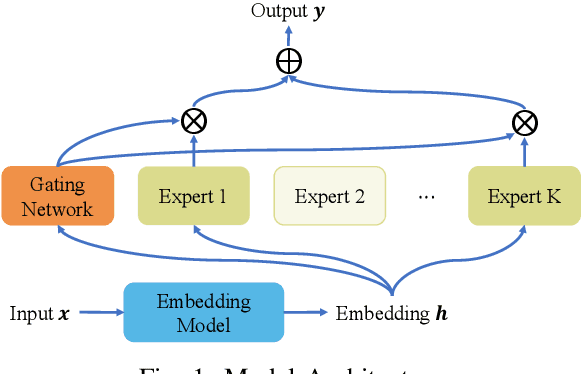
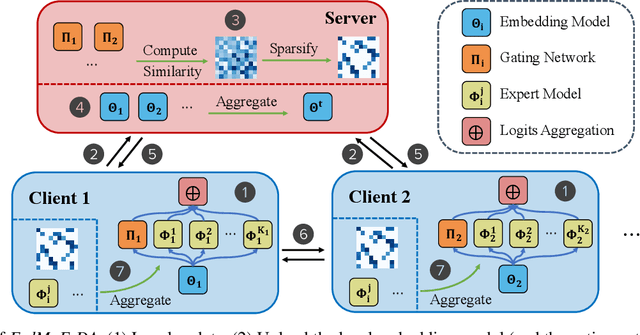
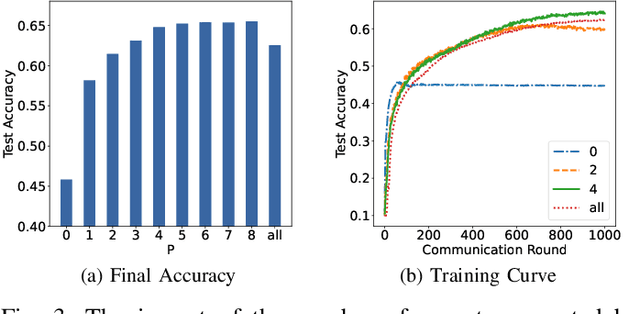
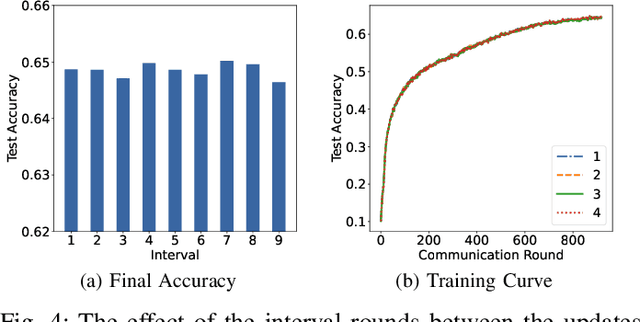
Abstract:Federated learning (FL) is a collaborative machine learning approach that enables multiple clients to train models without sharing their private data. With the rise of deep learning, large-scale models have garnered significant attention due to their exceptional performance. However, a key challenge in FL is the limitation imposed by clients with constrained computational and communication resources, which hampers the deployment of these large models. The Mixture of Experts (MoE) architecture addresses this challenge with its sparse activation property, which reduces computational workload and communication demands during inference and updates. Additionally, MoE facilitates better personalization by allowing each expert to specialize in different subsets of the data distribution. To alleviate the communication burdens between the server and clients, we propose FedMoE-DA, a new FL model training framework that leverages the MoE architecture and incorporates a novel domain-aware, fine-grained aggregation strategy to enhance the robustness, personalizability, and communication efficiency simultaneously. Specifically, the correlation between both intra-client expert models and inter-client data heterogeneity is exploited. Moreover, we utilize peer-to-peer (P2P) communication between clients for selective expert model synchronization, thus significantly reducing the server-client transmissions. Experiments demonstrate that our FedMoE-DA achieves excellent performance while reducing the communication pressure on the server.
FedReMa: Improving Personalized Federated Learning via Leveraging the Most Relevant Clients
Nov 04, 2024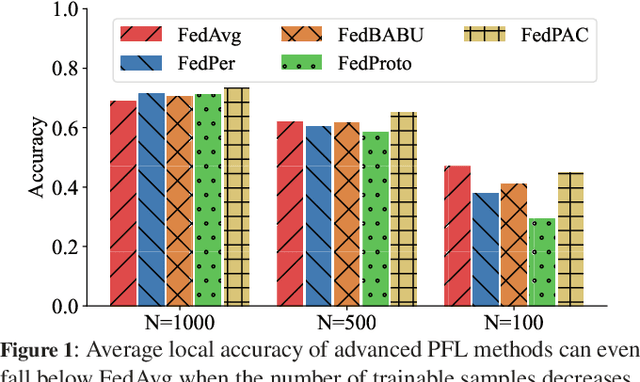
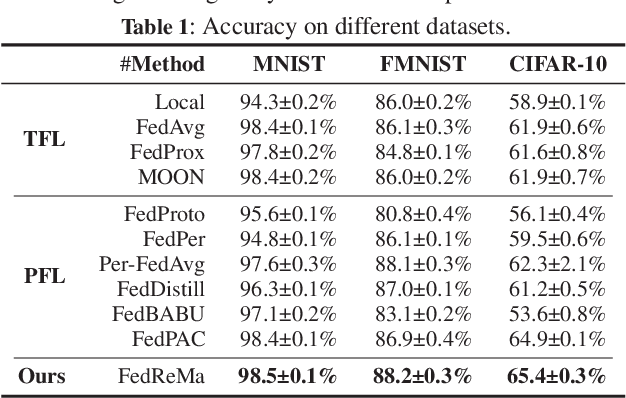
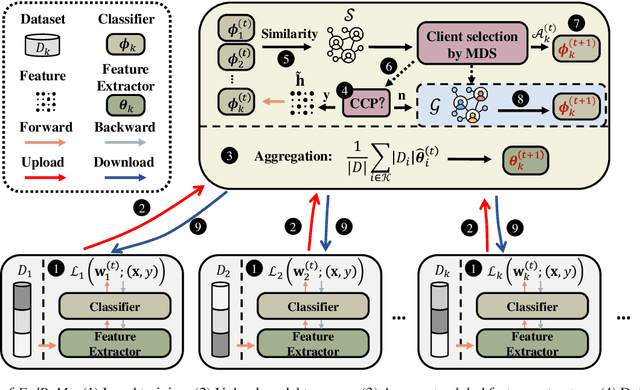
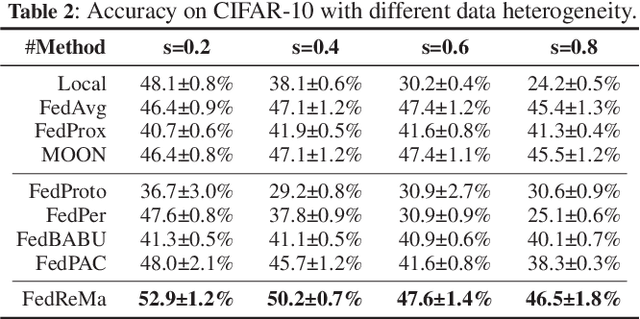
Abstract:Federated Learning (FL) is a distributed machine learning paradigm that achieves a globally robust model through decentralized computation and periodic model synthesis, primarily focusing on the global model's accuracy over aggregated datasets of all participating clients. Personalized Federated Learning (PFL) instead tailors exclusive models for each client, aiming to enhance the accuracy of clients' individual models on specific local data distributions. Despite of their wide adoption, existing FL and PFL works have yet to comprehensively address the class-imbalance issue, one of the most critical challenges within the realm of data heterogeneity in PFL and FL research. In this paper, we propose FedReMa, an efficient PFL algorithm that can tackle class-imbalance by 1) utilizing an adaptive inter-client co-learning approach to identify and harness different clients' expertise on different data classes throughout various phases of the training process, and 2) employing distinct aggregation methods for clients' feature extractors and classifiers, with the choices informed by the different roles and implications of these model components. Specifically, driven by our experimental findings on inter-client similarity dynamics, we develop critical co-learning period (CCP), wherein we introduce a module named maximum difference segmentation (MDS) to assess and manage task relevance by analyzing the similarities between clients' logits of their classifiers. Outside the CCP, we employ an additional scheme for model aggregation that utilizes historical records of each client's most relevant peers to further enhance the personalization stability. We demonstrate the superiority of our FedReMa in extensive experiments.
 Add to Chrome
Add to Chrome Add to Firefox
Add to Firefox Add to Edge
Add to Edge